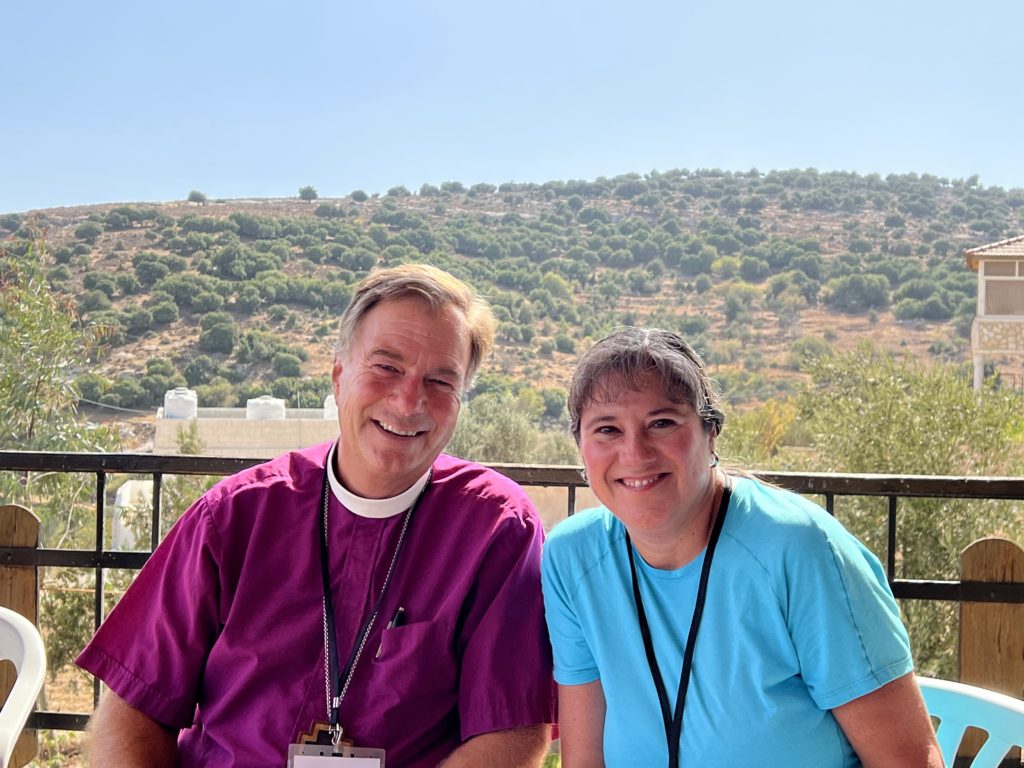When generosity meets a much-needed autoclave
May 25, 2023- Posted in Healthcare, People, Supporters, Uncategorized
Q&A with Bishop Greg and Marti Rickel: Taking the next step along the pilgrim way
Bishop Greg and Marti Rickel have made many pilgrimages to the Holy Land. In October 2022 they accompanied AFEDJ trustees and sta! on site visits to a dozen diocesan schools, hospitals, and centers for children with disabilities in Jordan, Palestine, and Israel. At St. Luke’s Hospital in Nablus, the only Christian hospital in the northern West Bank, the Rickels were moved to by the hospital’s desperate need for a new autoclave, a critical piece of equipment used to sterilize medical instruments. They recently talked with us about their decision and their perspectives on generosity. Bishop Rickel currently serves as chair of AFEDJ’s Board.

AFEDJ: What draws you back to the Holy Land?
GR: For me it’s the people, the Living Stones. I don’t need to always see the holy sites but I do need to connect to the people I’ve come to know and love and care about. Equally important for me is to remember that this is our ancestry. It’s important for us to be involved and curious to learn what is going on there and what people go through there. I can’t forget leaving Gaza and the man who accompanied us said, as I walked to the checkpoint, “Don’t forget us.” I think of him a lot when I ask myself, “Why do I return?”
MR: We owe it to the people to keep showing up to support them. They are entrusted with our homeland. I wish we had a Christian version of the kibbutz – send people there for three to six months so the Christians there would know we won’t forget them.
AFEDJ: Tell us about your first visit to St. Luke’s Hospital.
MR: My first visit to St. Luke’s was on my second or third pilgrimage. Greg’s mother was on that trip, and she and I are both registered nurses. When the leaders at St. Luke’s found out we were both nurses, they took us right up front of the group and gave us a tour of the ICU. We were both so honored to be there and to be welcomed by them. On this recent visit in October we had the opportunity to sit down with staff at lunch and ask about
the specific and pressing needs. The idea that they had an undependable, aging autoclave in a hospital that takes care of anyone who arrives at their door feels like: “They’ve got to have that!” My late step-father was a physician, and he’d say, “Of course that’s the first thing they need!” We want to honor the people in our family who have left us gifts in ways that would be meaningful to them. Making it possible for St. Luke’s to obtain a new autoclave is one way to do that.
AFEDJ: What would you say to those who want to support Holy Land Christians ?
MR: I’d say you’ll never be so gratified because the need is so great. Giving back to Christians in the land of Jesus is one of the best things you can do. And it doesn’t matter how much you give. It matters that you’re giving.
GR: We just received a thank you letter from Salwa Khoury, an administrator at St. Luke’s. She wrote that these are catastrophic times in Nablus and that knowing they have friends who will pay attention and help is so important. You’ll never regret making a gift. Generosity always has that effect. We should try to make a stretch which for every person is different. Our giving, if it really means something to us, ought to be enough that we notice. Sacrificial giving is the spirit of Christianity.
A friend once visited with a 102-year-old parishioner. He asked her, “How do you get to live to be over 100?” She replied, “I never once in my life resisted a generous urge.” I’ve never forgotten that.
